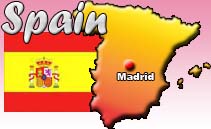Spanish village soars to fame as place where nothing happens
Madrid - The eastern Spanish village of Miravete de la Sierra markets itself as an unusual kind of tourist attraction: a place where nothing ever happens.
The eastern Spanish village of Miravete de la Sierra markets itself as an unusual kind of tourist attraction: a place where nothing ever happens.
"In its peaceful streets, there are no cars, no traffic lights, in fact there is nothing. The time does not pass even by putting the clock forward," one of Miravete's 12 residents,
86-year-old Cristobal Sanguesa, says on an original website which has become the rage among internet surfers and bloggers.
"Even the flies here are so calm that they look like a frozen image," Sanguesa says while leading the visitor on a virtual walk through the narrow cobblestone streets of the village located in Teruel province.
"There is no better place to face yourself," the website says.
In the early 20th century, Miravete still had around 500 residents who subsisted on agriculture and cattle raising, mayor Jose Listo told the Deutsche Presse-Agentur dpa in a telephone interview.
It then suffered the fate of hundreds of Spanish villages, with most of the population moving to cities in search of an easier living in the 1960s and 1970s.
Miravete now has only 12 permanent residents, the youngest of them around 50 years old, though dozens of emigrants return for the summer, when the cold does not bite in the mountain village located at an altitude of 1,200 metres.
The tranquil life in Miravete took a new turn when a communications company picked it for an "experiment," as Listo calls it.
"We were looking for a tiny village which had nothing to make it famous," said Pablo Alzugaray, director of the company Shackleton.
The village authorities immediately agreed with the idea of a publicity campaign in the hope of drawing tourists, new residents, and restoring Miravete's three 16th-century buildings: the Renaissance-style church, the tower and the market.
The website invites donations by purchasing a roof tile for the church or a puppet representing any one of the 12 residents, the latter for the hefty price of 180 euros (266 dollars).
Along with some television ads, the website has led to wider media interest and put Miravete on the tourism map.
"The only hotel was in a ruinous situation," Listo says, "but more tourists are now coming. Two rural houses also let rooms to visitors."
The website may be a fun idea, but seriously, why would anyone want to visit a place like Miravete?
Listo's reply: It has a lot to offer.
"Peace, tranquillity, walks along the riverside, hikes in beautiful landscapes," he says.
Don't Miravete residents fear that tourism could disturb the peace they are so proud of? "The limited tourism infrastructure will put a natural limit to the number of tourists," Listo replies. The hotel, for instance, has only eight rooms.
Bringing semi-abandoned villages back to life only through tourism would, in any case, be "very difficult," the mayor says.
If new economic activities are not found and "very aggressive measures" are not taken, Miravete could die away within 50 years, he admits.
For further information: www. elpuebloenelquenuncapasanada. com (dpa)